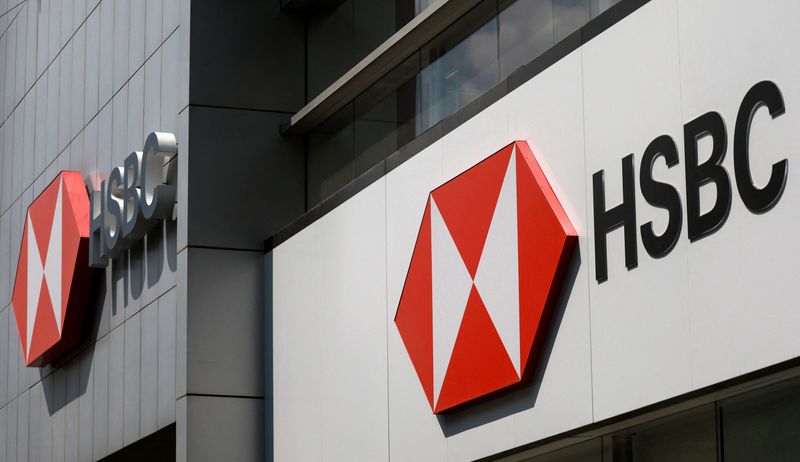Introduction: Navigating the Shifting Tides of HSBC’s Share Price Today
Picture this: You’re a small business owner, trying to balance your entrepreneurial dreams while also managing your investments. You glance at your portfolio and see that hsbc share price today has just made a significant move. What does that mean for your business, and more importantly, for your investments in the global financial market?
In 2025, the movements of big banks like HSBC are more than just numbers—they are signals. They tell a larger story about the global economy, market sentiments, and investor confidence. Today, we will delve into HSBC’s share price, explore the factors affecting its fluctuation, and provide you with insights that could help you understand its current standing and future trajectory.
By the end of this post, you’ll have a clearer picture of what’s driving HSBC’s share price today and why it matters for both investors and businesses alike.
What Is HSBC Share Price Today?
Before we dive into the specifics of HSBC’s share price, let’s first break down what it is and why it fluctuates.
The share price of HSBC, like any publicly traded company, represents the value at which the stock is being bought and sold in the market. This price is influenced by a variety of factors, from financial results to broader economic conditions, geopolitical events, and investor sentiment.
At the core, HSBC’s share price reflects investor confidence in the company’s ability to navigate economic challenges and deliver profits. It’s a daily snapshot of how investors view HSBC’s future prospects, shaped by everything from its quarterly earnings reports to global financial crises.
Why HSBC Share Price Matters in 2025
In 2025, the financial landscape has shifted significantly. The global recovery from the pandemic, inflationary pressures, and geopolitical tensions are just a few of the factors impacting how financial institutions operate. Understanding HSBC’s share price today is crucial for several reasons:
- Investor Sentiment and Trust: For individual and institutional investors, HSBC’s stock is a bellwether for the banking industry. A rise or fall in the share price can indicate broader market trends and investor confidence in the financial sector.
- Global Economic Indicators: As a global bank with a presence in major financial hubs, HSBC’s performance often reflects the health of international markets. If HSBC’s share price is down, it could signal instability in key regions like Asia, Europe, or the US.
- Strategic Decisions for Small Business Owners: If you’re running a small business, understanding HSBC’s stock movements could help you assess the broader economic climate. A declining share price could indicate tightening credit conditions, which may affect your business’s access to capital.
Factors Influencing HSBC’s Share Price Today
There are numerous factors that contribute to the rise and fall of HSBC’s stock price. Let’s break them down:
1. Global Economic Climate
In the wake of the 2020s economic shifts, markets have become more sensitive to global events. Inflation rates, central bank interest rate decisions, and recessions in key markets can heavily impact financial stocks like HSBC. For instance, a sudden hike in interest rates in the US could cause investors to reevaluate their positions in HSBC, affecting the share price.
2. HSBC’s Financial Health and Earnings Reports
HSBC’s quarterly earnings reports offer a snapshot of how the bank is performing. Investors look at key metrics such as revenue growth, profitability, and loan loss provisions to gauge the bank’s health. If HSBC reports solid earnings, the share price is likely to rise, while disappointing results could cause a decline.
3. Geopolitical Events
Given HSBC’s international presence, geopolitical events—such as trade wars, political unrest, or changes in banking regulations—can have a direct impact on its share price. For example, uncertainty around Brexit or the ongoing tensions between the US and China could affect HSBC’s business in those regions, influencing stock performance.
4. Technological Advancements and Digital Banking
HSBC’s embrace of digital banking and financial technology is another factor shaping its share price. Investors are increasingly looking at how banks are investing in AI, blockchain, and other technologies to streamline operations and reach new markets. A strong move toward tech-driven solutions can signal growth potential, boosting the stock price.
Step-by-Step Breakdown of How to Analyze HSBC’s Share Price Today
As an investor or business owner, analyzing HSBC’s share price can seem like an overwhelming task. But it doesn’t have to be. Here’s a simple breakdown:
Step 1: Check the Current Price
Start by checking HSBC’s live stock price on a financial news website or through a brokerage platform. This is your baseline.
Step 2: Review Recent Market News
Look for any major news regarding HSBC. Has the company announced new initiatives, partnerships, or leadership changes? Are there macroeconomic developments affecting its business?
Step 3: Analyze Earnings Reports
HSBC releases quarterly and annual earnings reports. Look at revenue, earnings per share (EPS), and guidance for future growth. A strong report often signals a positive outlook for the stock.
Step 4: Monitor Global Economic Indicators
Pay attention to central bank announcements, inflation data, and major international events. These can give you a sense of whether HSBC is positioned to perform well or face headwinds.
Step 5: Understand Market Sentiment
Sometimes, market sentiment can influence HSBC’s share price more than fundamentals. Keep an eye on market trends and overall investor sentiment toward the banking sector.
Benefits of Tracking HSBC’s Share Price
Understanding HSBC’s share price provides several advantages:
- Investment Strategy: For investors, it helps fine-tune investment strategies. A rising share price could mean it’s time to buy, while a decline could signal a sell or hold strategy.
- Business Planning: Small business owners can gauge broader market conditions, helping them make more informed decisions about expansion, financing, or hiring.
- Risk Management: Keeping an eye on HSBC’s performance helps mitigate risks associated with economic instability and fluctuating market conditions.
Challenges of Monitoring HSBC’s Share Price
While monitoring HSBC’s share price can be useful, it’s not without challenges:
- Market Volatility: Financial markets are inherently volatile. A sudden shift in investor sentiment or global events can cause dramatic fluctuations in the share price, making it hard to predict short-term movements.
- Complexity of Data: Interpreting earnings reports, global economic data, and market sentiment can be complex, requiring a deeper understanding of the financial landscape.
- Dependence on External Factors: HSBC’s performance isn’t just determined by the bank itself—it’s influenced by macroeconomic conditions, which can be unpredictable.
Future Trends for HSBC’s Share Price
As we move into the second half of the 2020s, several trends could shape HSBC’s share price:
- Sustainability and ESG: As environmental, social, and governance (ESG) criteria become more important to investors, HSBC’s commitment to sustainability could attract more capital, potentially boosting its share price.
- Digital Banking Revolution: The ongoing push for digital banking and innovation in financial technology will likely play a critical role in HSBC’s future growth. Investors are watching closely to see how well the bank adapts.
- Global Expansion: Expanding into emerging markets, particularly in Asia and Africa, could provide significant growth opportunities for HSBC, impacting its long-term share price performance.
FAQs About HSBC Share Price Today
Q1: How can I check HSBC’s share price today?
You can check HSBC’s share price on financial news websites like Bloomberg, Reuters, or through online brokerage platforms.
Q2: What affects HSBC’s share price the most?
The main factors include global economic conditions, HSBC’s earnings reports, geopolitical events, and market sentiment toward the banking sector.
Q3: Should I buy HSBC shares now?
Whether to buy depends on your investment strategy and market analysis. If you’re uncertain, consider consulting a financial advisor.
Conclusion: Keep an Eye on HSBC’s Share Price for Smarter Decisions
Tracking HSBC’s share price is not just about numbers; it’s about understanding the larger economic forces at play. By analyzing its movements, you can make more informed investment decisions, plan for your business, and stay ahead in an ever-changing market. Whether you’re a seasoned investor or a business owner, the ability to interpret HSBC’s stock trends will give you an edge in navigating the financial landscape.
Ready to dive deeper into HSBC’s future? Start by reviewing its latest earnings report and considering how the global economy might shape its next move. Stay informed, stay prepared.




